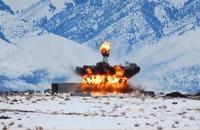-
Y-12 security breach update: Old nun awaits sentencing while costs of new Y-12 facility not to be released until 2015
On 28 July 2012, three senior citizens, led by an 83-year old nun, easily breached the supposedly impregnable security systems protecting the Y-12 National Security Complex at Oak Ridge, Tennessee. The three peace activists wondered the grounds of the maximum security facility for a while before being noticed by security personnel. While the three aging protesters are awaiting sentencing, the two companies — Bechtel Corporation and Babcock and Wilcox – which were responsible for designing and implementing security at Y-12, have been named as the primary construction contractors for planning and design of the new uranium processing facility (UPF) to be built at Y-12.
-
-
Early warning system to detect abrupt climate change impacts
Climate change has increased concern over possible large and rapid changes in the physical climate system, which includes the Earth’s atmosphere, land surfaces, and oceans. Some of these changes could occur within a few decades or even years, leaving little time for society and ecosystems to adapt. A new report from the National Research Council states that even steady, gradual change in the physical climate system can have abrupt impacts elsewhere — in human infrastructure and ecosystems for example — if critical thresholds are crossed. The report calls for the development of an early warning system that could help society better anticipate sudden changes and emerging impacts.
-
-
Key to protecting Earth from asteroids: time

Scientists say that humanity can address the threats from asteroids of any size if given enough time and notice of the asteroid’s existence and trajectory. Even an asteroid the size of the 10-kilometer-wide space rock which scientists hold responsible for the extinction of dinosaurs sixty-five million years ago, can be destroyed, although it would take hitting the asteroid with multiple spacecrafts over a period of several decades.
-
-
Defending against electromagnetic-pulse attacks

We are all familiar with the power of electromagnetic attacks from the movies: in “Ocean’s Eleven,” George Clooney’s gang disables Las Vegas’ power grid, and Keanu Reeves’ henchmen hold off the enemy robot fighters from their spaceship in the “Matrix Trilogy.” The heroes in the films succeed by sending out a very strong electromagnetic pulse, which changes the voltage in the vicinity so that regulators, switches, and circuit boards in electronic equipment go crazy. Researchers are now trying to figure out how such attacks can be detected. They have developed a measurement instrument for this purpose that is capable of determining the strength, frequency, and direction of electromagnetic attacks.
-
-
Weather risk management should be part of companies’ overall risk management
Volatile weather activity is increasing around the world. While extreme events such as typhoon Haiyan in the Philippines or flood Cleopatra in Sardinia may capture the headlines, minor fluctuations in expected weather can have big impacts on business performance across a wide range of industries. A new report focuses on the growing importance of weather risks for businesses, highlighting the economic impact of fluctuating weather conditions and how companies can protect themselves, using new approaches to “weather risk management.” Weather risk management products are already widely used in the United States, where they have become more readily accepted as a standard feature of companies’ overall risk management.
-
-
FY 2012 sees first constant-dollar decline in higher education R&D since FY 1974
The National Science Foundation (NSF) says that university spending on R&D in all fields totaled $65.8 billion in FY 2012. After adjusting for inflation, higher education R&D declined by 1 percent in FY 2012. This represents the first constant-dollar decline since FY 1974 and ends a period of modest growth in higher education R&D during FYs 2009-11, when R&D expenditures increased an average of 5 percent each year.
-
-
Deflecting asteroids to avoid Armageddon

It sounds like the script for a Hollywood film: a giant meteorite from outer space heading straight for the Earth and threatening the destruction of mankind. Yet such a scenario does represent a real threat to our planet, as researchers reckon that we can expect an asteroid to collide with Earth every few hundred years. In real life, though, nobody wants to rely on a rescue plan hastily improvised at the last minute. Scientists with the European-funded research project NEOShield are working to develop concepts designed to help avert these impacts and to alter asteroids’ orbits as they race toward Earth.
-
-
Testing explosives capability helping armor research

In modern warfare, military vehicles use enormous armored panels to defend against weapons. Boosting protection by adding more steel, however, eventually makes equipment too heavy to use. There are other ways to defend against a weapon besides trying to stop it with just mass — smarter, more economic ways that are waiting to be discovered.
-
-
Physics can lead the U.K. economic recovery: IOP president
Physics research in the United Kingdom has had a great year and physics can lead the U.K. economic recovery, but ongoing success depends on a healthy “educational pipeline,” Institute of Physics (IOP) president Frances Saunders told. For the success of physics research and application to continue, however, there had to be enough young people choosing to study physics post-16 and at university, she said. Numbers studying physics A-level had increased from a low point of 27,000 in 2006 to almost 36,000 this year, and applications to undergraduate physics courses had increased by 8 percent in 2013, she said.
-
-
Solar-powered, fabric-woven battery for “wearable electronics”

Though some people already seem inseparable from their smartphones, even more convenient, wearable, solar-powered electronics could be on the way soon, woven into clothing fibers or incorporated into watchbands. This novel battery development could usher in a new era of “wearable electronics.”
-
-
Helping farmers cope with climate change is big business
Monsanto estimates there is a $20 billion market for employing massive data analysis to provide weather forecasting and crop-growing advice tailored to individual plots of land. With a $300 billion agriculture industry in the United States exposed to climate change, predicting the effects of warming temperature is critical to the industry. Monsanto has recently acquired – for $1 billion — the Climate Corporation, a Silicon Valley company which uses data analysis and algorithms to redefine how farmers grow and harvest crops. The company provides farmers with insights which predict weather pattern and the changing effects on crops.
-
-
Purdue selects students for the 2014 future science leaders class
Emerging Leaders in Science and Society (ELISS) is a program of the American Association for the Advancement of Science (AAAS). “ELISS prepares graduate and professional students to collaborate within a diverse team to understand the key drivers of complex problems and to plan and implement a team project,” said ELISS director Melanie Roberts. “ELISS graduates will be better able to integrate expertise across disciplines and coordinate action across boundaries to tackle our most complex issues.”
-
-
Navy “mine-hunter” AUV sets mission-endurance record
The U.S. Naval Research Laboratory’s (NRL) Acoustics Division, with Bluefin Robotics, executed a record setting 507 kilometer (315 mile), long-endurance autonomy research mission using its heavyweight-class mine countermeasures autonomous underwater vehicle (AUV), Reliant. NRL’s Reliant AUV, when equipped with a low frequency broadband (LFBB) sonar system, is perhaps best known as the prototype for the new U.S. Navy Knifefish mine-hunter.
-
-
Methane emissions in the U.S. exceed government estimates
Along with carbon dioxide, methane is one of the most important greenhouse gases in terms of its potential to raise global temperatures. It also encourages the formation of surface ozone in cities and affects other aspects of atmospheric chemistry. A new study finds that emissions of methane from fossil fuel extraction and refining activities in the South Central United States are nearly five times higher than previous estimates. The collaborative study indicates that in addition to fossil fuel extraction, animal husbandry is also a major contributor to the higher-than-expected methane emissions.
-
-
NIST: Joplin tornado highlights need for building design, construction standards
Nationally accepted standards for building design and construction, public shelters, and emergency communications can significantly reduce deaths and the steep economic costs of property damage caused by tornadoes. That is the key conclusion of a two-year technical NIST investigation into the impacts of the 22 May 2011 tornado that struck Joplin, Missouri. Report and recommendations released for public comment.
-
More headlines
The long view
New Technology is Keeping the Skies Safe
DHS S&T Baggage, Cargo, and People Screening (BCP) Program develops state-of-the-art screening solutions to help secure airspace, communities, and borders
Factories First: Winning the Drone War Before It Starts
Wars are won by factories before they are won on the battlefield,Martin C. Feldmann writes, noting that the United States lacks the manufacturing depth for the coming drone age. Rectifying this situation “will take far more than procurement tweaks,” Feldmann writes. “It demands a national-level, wartime-scale industrial mobilization.”
How Artificial General Intelligence Could Affect the Rise and Fall of Nations
Visions for potential AGI futures: A new report from RAND aims to stimulate thinking among policymakers about possible impacts of the development of artificial general intelligence (AGI) on geopolitics and the world order.
Smaller Nuclear Reactors Spark Renewed Interest in a Once-Shunned Energy Source
In the past two years, half the states have taken action to promote nuclear power, from creating nuclear task forces to integrating nuclear into long-term energy plans.
Keeping the Lights on with Nuclear Waste: Radiochemistry Transforms Nuclear Waste into Strategic Materials
How UNLV radiochemistry is pioneering the future of energy in the Southwest by salvaging strategic materials from nuclear dumps –and making it safe.
Model Predicts Long-Term Effects of Nuclear Waste on Underground Disposal Systems
The simulations matched results from an underground lab experiment in Switzerland, suggesting modeling could be used to validate the safety of nuclear disposal sites.
